Readings Newsletter
Become a Readings Member to make your shopping experience even easier.
Sign in or sign up for free!
You’re not far away from qualifying for FREE standard shipping within Australia
You’ve qualified for FREE standard shipping within Australia
The cart is loading…






Was Churchill correct when he claimed the Second World War could easily have been prevented if Chamberlain had not appeased Hitler? How far did Churchill and Chamberlain differ on defence and foreign policy? To what extent was Chamberlain responsible for military defeats in 1940? In this new account of appeasement, G. C. Peden addresses these questions and provides a comparative analysis of Chamberlain and Churchill's views on foreign policy and strategic priorities, explores what deterrence and appeasement meant in the military, economic and political context of the 1930s and where Chamberlain and Churchill agreed and disagreed on how best to deter Germany. Beginning in 1931 when Chamberlain became Chancellor of the Exchequer, this book explores the evolution of British policy towards Germany through to the Munich Agreement and its aftermath within the context of Britain's power to influence international affairs in the 1930s and of contemporary intelligence.
$9.00 standard shipping within Australia
FREE standard shipping within Australia for orders over $100.00
Express & International shipping calculated at checkout
Was Churchill correct when he claimed the Second World War could easily have been prevented if Chamberlain had not appeased Hitler? How far did Churchill and Chamberlain differ on defence and foreign policy? To what extent was Chamberlain responsible for military defeats in 1940? In this new account of appeasement, G. C. Peden addresses these questions and provides a comparative analysis of Chamberlain and Churchill's views on foreign policy and strategic priorities, explores what deterrence and appeasement meant in the military, economic and political context of the 1930s and where Chamberlain and Churchill agreed and disagreed on how best to deter Germany. Beginning in 1931 when Chamberlain became Chancellor of the Exchequer, this book explores the evolution of British policy towards Germany through to the Munich Agreement and its aftermath within the context of Britain's power to influence international affairs in the 1930s and of contemporary intelligence.